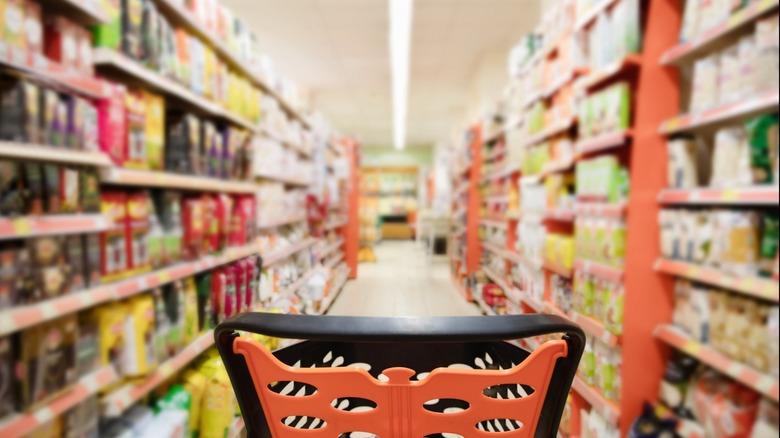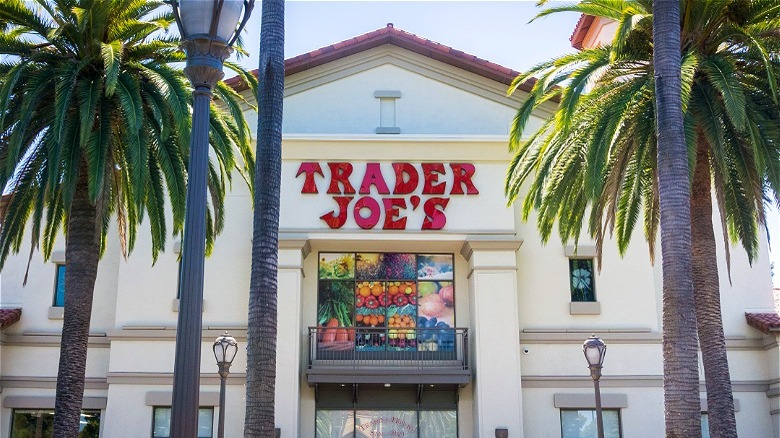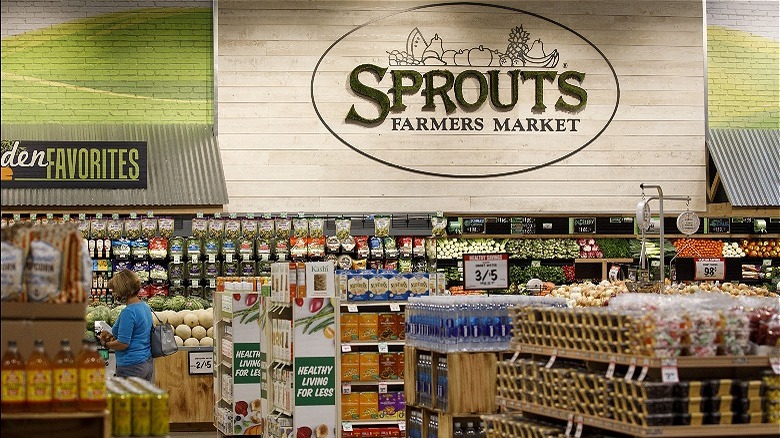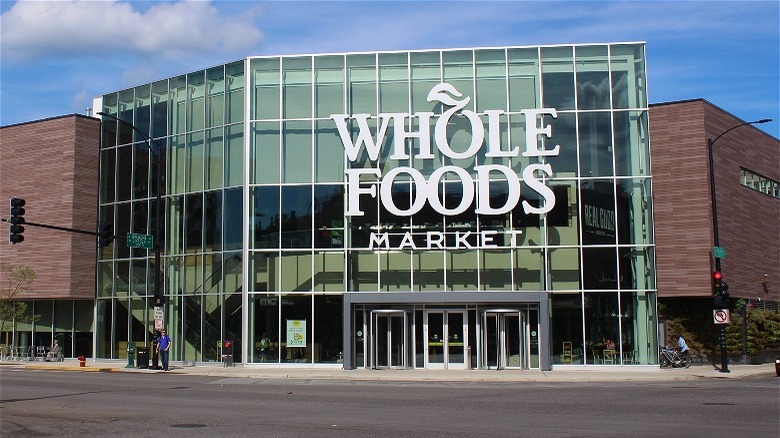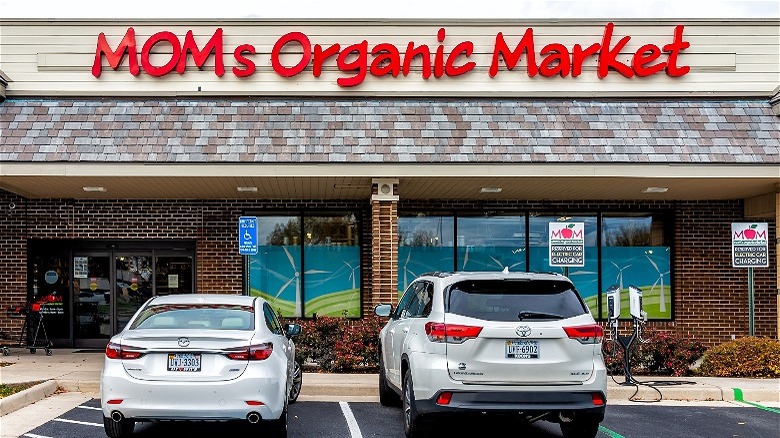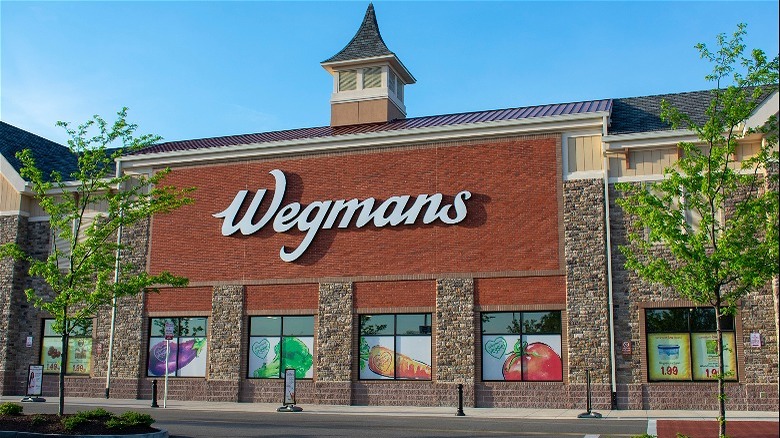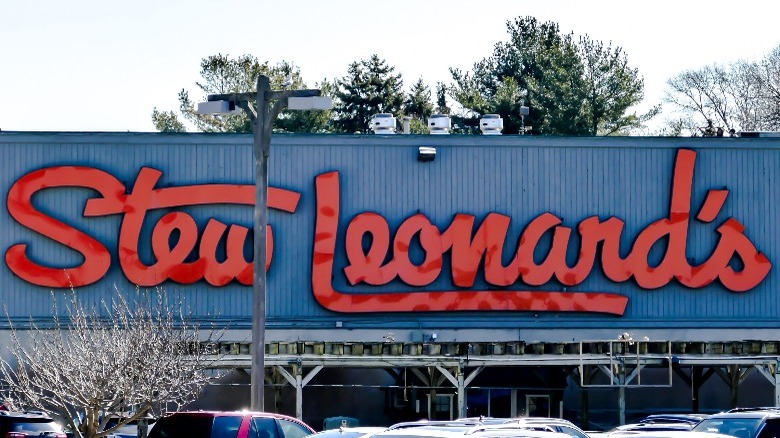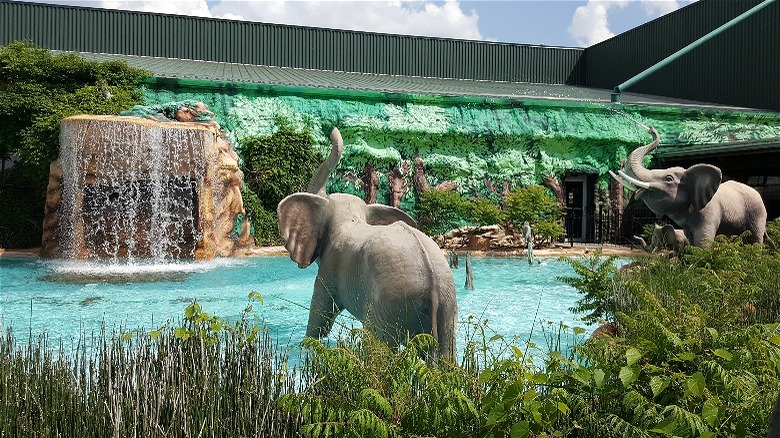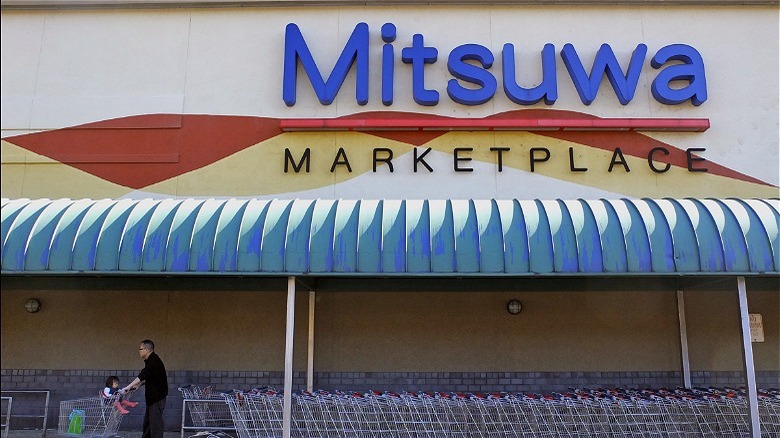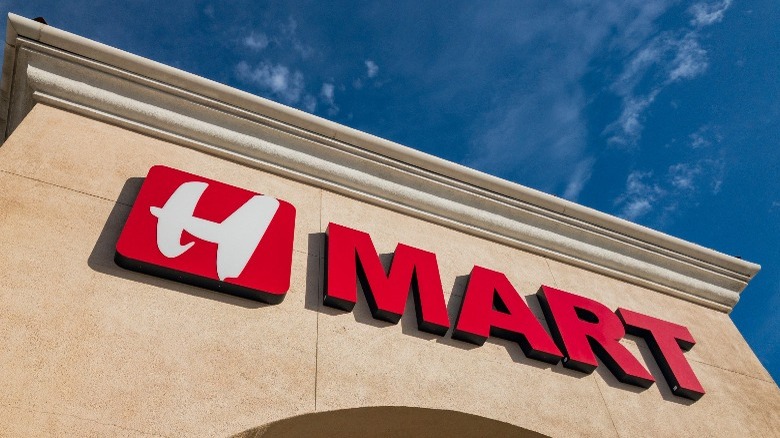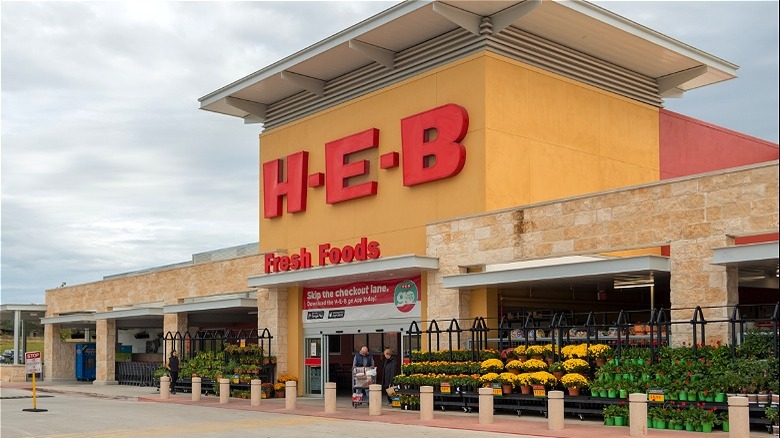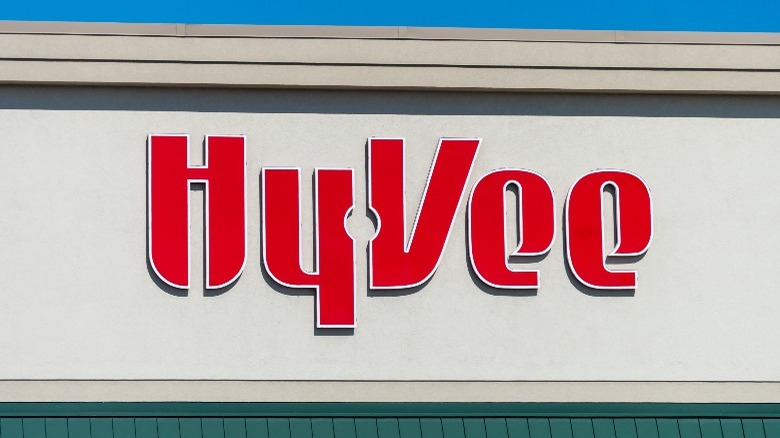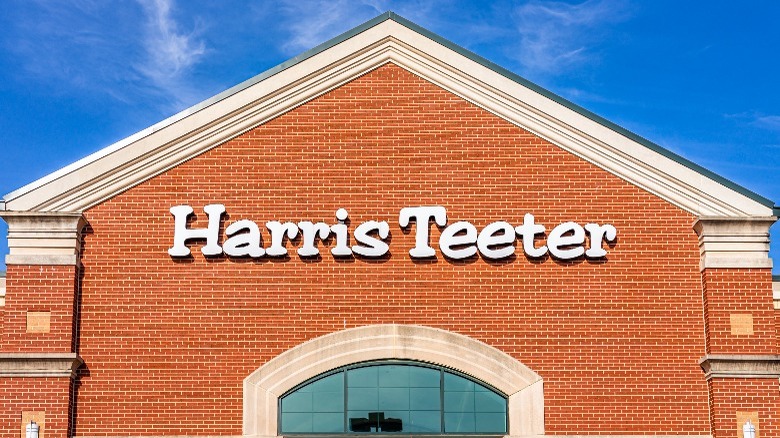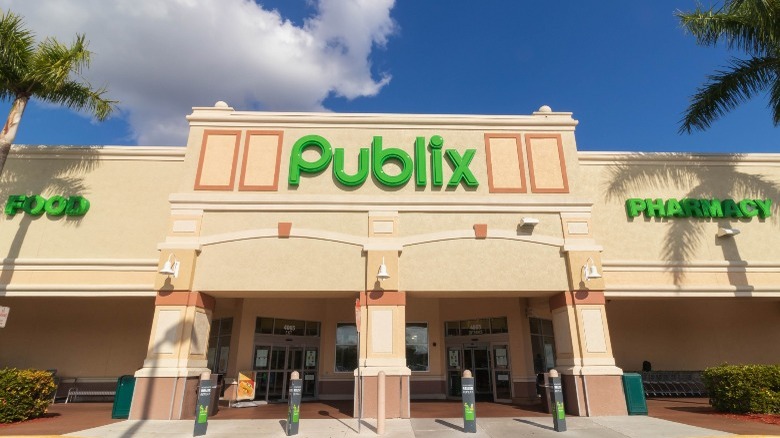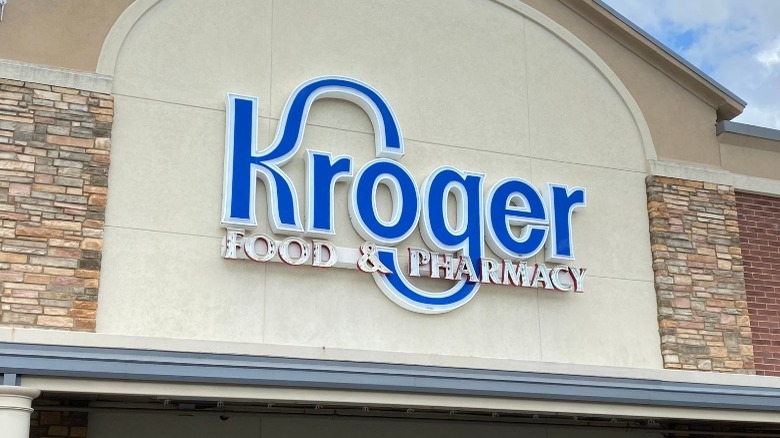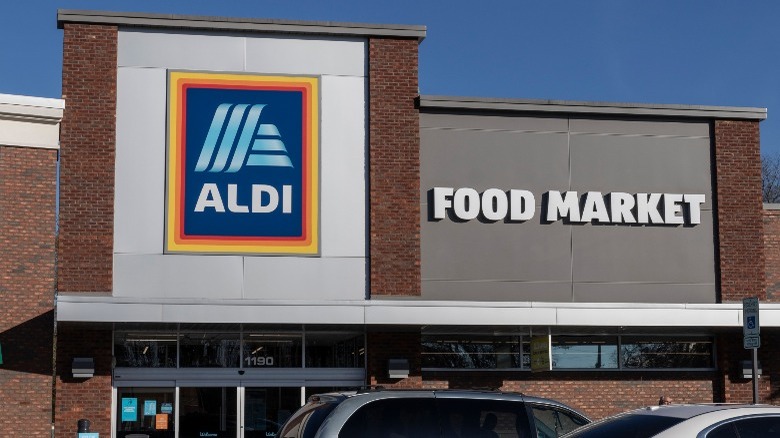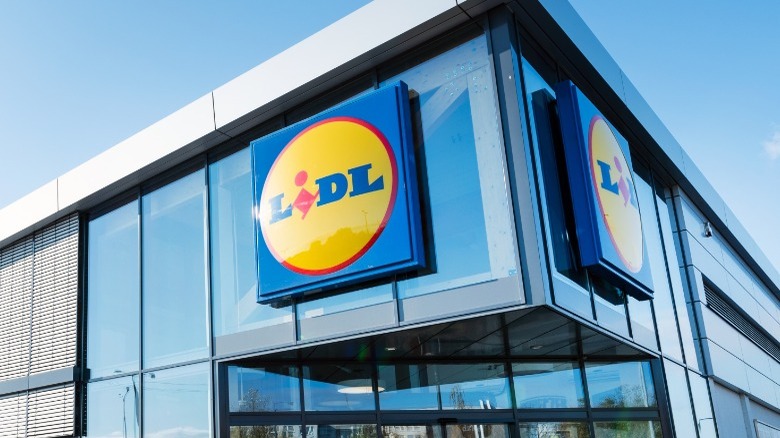Best Grocery Stores In The US
We've all gotten more used to going to the grocery store lately. In 2020, people began buying more groceries and changing their shopping habits — not to mention their entire lives — in myriad ways (via The New York Times). Since the start of 2022, price increases from inflation are on grocery shoppers' minds. But as inflation is becoming more impossible to avoid, we can take a look at which grocery stores are giving us more than just good prices.
Think about healthiness, sustainability practices, organic food offerings, in-house prepared goods, name brand products, discounts, easy-to-navigate aisles, and even atmosphere. Our favorite places to buy groceries wouldn't be the same without them. But not every store can be the best at everything.
Why are people obsessed with Trader Joe's employees? What's with Whole Foods' high prices? Where can I find a grocery store with animatronic singing cows? What's the best place to get Japanese groceries? Why should I try shopping at German chains like Aldi and Lidl? Each supermarket has something unique to offer shoppers. Read on to find what the best grocery stores in the U.S. are offering their customers.
Trader Joe's
The original Trader Joe's opened in 1967 in Pasadena, California. Due to the boom of tiki bars in the '60s, founder Joe Coulombe (who had recently graduated from Stanford with an MBA) landed on the supermarket's tropical theme (via Reader's Digest). The chain was an instant hit and has continued to grow over the decades. As of 2022, Trader Joe's operates over 500 locations in 42 different states.
Bespoke items are one of Trader Joe's biggest draws. The chain's Everything But the Bagel seasoning, cauliflower gnocchi, Mandarin orange chicken, dark chocolate peanut butter cups, and chicken tikka masala are just a few of the Trader Joe food items with cult followings. The chain is also lovingly known for having inexpensive wine and low prices across the board. The supermarket lowers costs in a few ways: They make their own products, buy directly from other suppliers, and keep overhead costs — such as electricity — down. That's why items tend to be so cheap.
A festive atmosphere, affordability, and cleanliness are all reasons why people love Trader Joe's. The company also sells many organic products and carries over 70 vegan goods, catering to shoppers with particular dietary needs. But there is one especially significant reason why it remains so popular: the friendly staff members. Yelp reviews of Trader Joe's staff are uniquely gushing. One example is this shopper's review: "Pleasant, helpful, and courteous best describes our cashier."
Sprouts Farmers Market
Sprouts Farmers Market opened its first location in 2002, in Chandler, Arizona. The flagship location was launched by father-and-son duo Stan and Shon Boney, the descendants of Henry Boney, who ran a fruit stand in San Diego. The family connection is why you see the phrase "farmers market" in the name of this grocery store chain. But it is indeed a grocery store, not a true farmers market. Over the past two decades, Sprouts stores have popped up all over the U.S. Today, there are around 380 stores across 23 states.
Organic foods make up the bulk of Sprouts' products. Per the company, "about 90 percent of the products we carry are natural or organic." You can even search for products based on different dietary needs, such as gluten-free, paleo, plant-based, keto, or non-GMO, online. When you do, dozens of options — whether you're looking for nondairy cheese, grass-fed beef, or gluten-free bread — will appear. At Sprouts, there is something for everyone's diet.
Sustainability is another focus of the chain. Sprouts pledges to ease its environmental impact by sourcing sustainable palm oil and seafood, partnering with local farmers, reducing plastic waste, and other practices. The chain famously has a bulk foods section that allows you to buy various amounts of nuts, seeds, grains, and other items without packaging. You can even bring your own container or buy a reusable cloth bag near the bulk section. One shopper said, "the bulk items area is impressive."
Whole Foods Market
In 1980, the first Whole Foods Market opened its doors in Austin, Texas. Per the chain, it was founded "when four local businesspeople decided the natural foods industry was ready for a supermarket format." New locations soon began popping up around the U.S. In 2017, as the chain was struggling, Amazon famously bought it up (via Britannica). As of 2022, Whole Foods has more than 500 locations in the U.S., U.K., and Canada.
Despite its positive qualities, Whole Foods is known for being expensive. Its price may be significantly higher than other stores, but for good reason. Whole Foods' commitment to clean eating goes above and beyond other stores — in fact, the chain bans hundreds of dangerous ingredients. If an item contains partially-hydrogenated oils, synthetic colors like yellow no. 6, and artificial sweeteners like aspartame, it will not be sold at Whole Foods, which is why you might pay more for the healthier products here.
The hot bar makes shopping at this grocery chain a special treat. What other supermarket has delicious, hot meals to pack as you shop? There are certainly a few, but none compare to Whole Foods. Sushi, pizza, and rotisserie chicken are all a part of the prepared foods section here. Yucca fries, mochi, curried cauliflower, and summer corn risotto are some employee recommendations. In our opinion, this aspect makes Whole Foods one of the best grocery stores.
MOM's Organic Market
MOM's Organic Market is a regional grocery chain based in the mid-Atlantic region, but it got its start in 1987 as a grocery delivery business. Today, it owns and operates stores in Maryland, Virginia, D.C., Pennsylvania, New York, and New Jersey. The company's commitment to organic food and environmentalism aligns it with grocery stores like Sprouts and Whole Foods. Although it's much smaller than those supermarket chains, MOM's still has over 20,000 followers on Twitter, where its bio reads "100% certified #organic produce, always."
Customers who shop at MOM's say the health food options are diverse. There is something for every kind of health nut. Regarding the Virginia location, one Yelp reviewer wrote, "pretty much anything you buy here will be delicious. I love their large kombucha selection, the fresh food aisle, the granola, the coffee, and the amazing frozen options too."
Along with organic produce, MOM's grocery stores are known for their non-edible products. Each store has a beauty and personal care section that offers makeup, aromatherapy, and candles. MOM's even sells its own line of vitamins and supplements, which are made under several different quality standards. There are even compostable and cruelty-free household items. All these sections give shoppers the opportunity to fill up on personal and home care items while getting their grocery shopping done at the same time.
Wegmans
Wegmans is older than most supermarkets. Its founders, the Wegman brothers, worked in the grocery business back in 1916. By 1930, they had opened up their first physical store. The chain is still run by the Wegman family today and boasts nearly 100 stores located in six different states (via Wegmans). Stores belonging to this regional chain are located in New Jersey, New York, Massachusetts, Pennsylvania, Maryland, and Virginia. In those states, Wegmans is popular with shoppers for a few reasons.
CheatSheet says it's because of the Wegmans experience. Stores are clean, have friendly employees, and sell products from the chain's trusted name brand. You can splurge on freshly-baked bread, in-house restaurants, and craft beers. These stores have more features to offer than other supermarkets — and for a reason. The average Wegmans is around twice the size of a typical grocery store. Per Kiplinger, most Wegmans are between 75,000 and 100,000 square feet, whereas competitors clock in around 46,000 square feet.
The chain is large and in charge. But along with spaciousness, it's known for the freshness of its produce. As a source told The Washington Post, Wegmans turns over its fruits and vegetable supply more often than competitor supermarkets. Additionally, Wegmans has partnerships with over 400 family-run farms that supply the chain with fresh, locally-grown food.
Stew Leonard's
One of the most unique grocery chains in the country is Stew Leonard's. The business began as a dairy delivery service that used trucks decorated with moo-ing cows. It became a grocery store in 1969 with the launch of Stew Leonard's first supermarket location. Although the original space was a mere 17,000 square feet when it opened, that same location is now around 100,000 square feet. Along with expanding its original store, Stew Leonard's now operates seven stores in the Northeast, including Connecticut, New York, and New Jersey.
As early as the 1980s, Stew Leonard's was known for its themed experience. During this decade, it was compared to Disneyland by The New York Times. This reputation comes from the Chuck E. Cheese-like animatronics that play music throughout the store, the costumed characters such as Clover the Cow, an outdoor petting zoo, and farm-themed decorations (via Business Insider). These touches have nothing to do with the groceries you'll be purchasing. But it makes shopping entertaining. Kids love it, too. As one Yelp reviewer wrote, "my daughter loves shopping At Stews."
Like other large stores such as Wegmans, Stew Leonard's has several departments. There is a bakery, butcher, dairy, deli, florist, seafood section, and wine store, in addition to your typical grocery store offerings. In each of these sections there are free samples, offering customers a taste of the store's house-made mozzarella and potato chips.
Jungle Jim's
Jungle Jim's International Market is a small grocery chain with a big reputation. It's been around since the '70s but only has two locations, both of which are in Ohio. Despite the small number of stores, these two spots take up over 500,000 square feet and offer a unique grocery shopping experience. You can even take a tour of Jungle Jim's — that's how much there is to see!
Both locations of Jungle Jim's feature a rainforest theme. To outsiders, it may look more like a theme park than a grocery store. According to Ohio Traveler.com, that means jungle scenes, waterfalls, animatronic singing creatures, and more. This place is truly a destination in itself. It's even rated the No. 1 thing to do in Fairfield, Ohio on Tripadvisor. On the website, one guest said, "this takes the idea of a grocery store to a whole other level beyond comprehension. You could spend hours here before seeing everything."
Along with the attractions, the food options are unbelievable. There is food from 70 different countries with approximately 1,400 cheeses, 17,000 wines, and 4,000 beers. There are more variations of your favorite food than you knew were possible. It was once reported that over 80,000 people visit the store every week (via Ancestral Findings). It would be overwhelming if every grocery store was like this, but we are still glad that Jungle Jim's exists.
Mitsuwa Marketplace
Mitsuwa Marketplace is a Japanese supermarket chain with a few locations scattered throughout the U.S. There are Mitsuwa Marketplaces everywhere from New Jersey to Hawaii, however, most of them are in California where the chain is headquartered. It was founded in 1998, per the company website.
Locations of this chain allow shoppers to sample a vast array of Japanese food options. As North Jersey.com explains, Mitsuwa Marketplace has "aisles stocked with shining sushi-grade seafood, whopping 15-pound bags of rice, and hundreds of varieties of sake, tofu, and ramen noodles." In addition to food, you can buy Japanese beauty products and home goods. One Yelp reviewer said of the shopping experience, "it looks like a regular grocery store from the outside but as soon as you step inside prepare for your eyes to glisten!"
To make the shopping experience even better, a food court accompanies each location of Mitsuwa Marketplace. On Yelp, a visitor remarked, "the food court is amazing and I love the salt ramen from here. Definitely worth the hype!" Food court vendors will vary based on location. For example, the San Diego location has a sushi restaurant, Japanese eatery, pickle store, crepe shop, and ramen restaurant. The Texas location even has a bookstore.
H Mart
The first H Mart opened in 1982 in Queens, New York. It's now the largest Asian supermarket chain in the country, with 97 stores in over a dozen different states. The company prides itself on offering Asian groceries, American foods, everyday essentials, upscale products, and food courts where shoppers can dine in-store.
While H Mart offers more than just one type of Asian cuisine, it's well known for its Korean products. Shoppers can buy foods like kimchi, the Korean soup naengmyun, Korean dumplings like mandoo, and banchan (Korean side dishes such as pickles and fish cakes, explains Good Home Chef). H Mart also sells Korean alcoholic beverages such as soju. This clear alcohol was considered the best-selling liquor in the world in 2020, so you might want to try it if you haven't yet.
Dessert offerings are another section that makes H Mart one of the best in the U.S. Per the blog Chocolate Class, some of the best Korean H Mart desserts are mochi (colorful, chewy, and typically circular dessert puffs), gangjeong (a candy usually made with nuts), and tteok (another sweet rice cake dessert, like mochi). As one Yelp reviewer wrote, "you can find your staples like kimchi and rice ... and yummy desserts like red bean popsicles and mochi."
H-E-B
H-E-B stands for the initials of its founder's son, Howard Edward Butt. You can laugh all you want, but the Butt family's singular store — launched in 1905 — became an American success story (via Texas Hill Country). Nowadays, H-E-B is still only found in one U.S. state, but there are hundreds of them there. In Texas alone, the chain has 319 stores (via Scrape Hero). Despite being confined to just one state, the chain is somehow "one of the largest independent food retailers in the nation" (via H-E-B).
A major draw of H-E-B is the name-brand goods. As My San Antonio explains, these items have their own Twitter fandom. People are particularly enthusiastic about the chain's knock-off Oreos (called Twisters), the Bagel Not Included seasoning, black pepper ketchup, club soda with sea salt, and Mootopia milk. KW San Antonio gave a shoutout to a few other H-E-B name-brand products such as cranberry pistachio bread, honey roasted peanut butter, crustless white bread, freshly made tortillas, and San Antonio sushi rolls. H-E-B even partners with the chain Whataburger to sell name-brand products beloved by grocery shoppers and burger eaters alike. As Forbes explains, part of the allure of these food items is their connection to Texas. "Walk into any H-E-B store, and the Texas theme is instantly and continuously apparent," writes the outlet.
Hy-Vee
Founders Charles Hyde and David Vredenburg opened the first Hy-Vee in 1930, in Beaconsfield, Iowa. In the following decade, 10 Hy-Vees were in operation with gross sales of around $1 million, per the grocery chain. Today, Hy-Vee has around 285 stores — all located in the Midwest — and sales have grown to around $12 million (via Hy-Vee). In 2021, the chain was ranked second in a list of the 10 best supermarkets in the country by USA Today. Superior customer service was cited as a significant reason for this recognition.
When someone is hired at Hy-Vee, they are given the unique opportunity to become a partial owner in the company. Employees are offered different stock opportunities. As Reader's Digest explains, "direct stakeholders include officers, store directors, and executive staff members, while more than 30,000 Hy-Vee employees are indirect stakeholders." This is just one way the chain tries to create a good environment for its workers. This is probably why Hy-Vee is known for its excellent staff. On Yelp reviews for an Omaha, Nebraska location, shoppers are consistently complimentary of the employees. Reviewers say staff are friendly, pleasant, efficient, and helpful. One reviewer wrote, "they never complain or seem upset when you ask them for help."
As the Louisville Courier-Journal says, "the Chinese food, the customer service, the in-house prepared brats and the discount on fuel for buying groceries" are what makes Midwesterners love Hy-Vee.
Harris Teeter
Harris Teeter is a regional grocery store chain that's been around since 1960, when North Carolina founders W.T. Harris and Willis Teeter opened up the first supermarket of its kind. Now, the chain operates around 250 stores as well as 60 gas stations. It's the largest grocery store chain in North Carolina (via North Carolina History), but you can also find Harris Teeters in seven different southeastern states plus Washington, D.C.
Special incentives and discounts are what keep shoppers coming back to Harris Teeter. First, there's the VIP parking program for military veterans. Each location of Harris Teeter has a few spaces reserved for vets doing their grocery shopping (via Watauga Democrat). Next, there is the fuel points program which can be used at Harris Teeter fueling stations (via Harris Teeter). When you buy certain items at the store, you are chipping away at those high gas bills. Yelp reviewers said the discount makes prices nearly competitive with Costco's, which is known for having cheap gas. "With the fuel points I had and the discount connected to my point value it made the gas the exact same price as Costco's price," wrote a Harris Teeter shopper.
Publix
Publix is one of the largest U.S. grocery store chains with over 1,200 stores. These stores are condensed into just seven states: Alabama, Florida, Georgia, North Carolina, South Carolina, Tennessee, and Virginia (via Publix). And the chain has had plenty of time to grow — it's been around since 1930 when founder George W. Jenkins started it all. These days, the powerhouse supermarket chain has plenty of fans throughout the southeast. Publix was rated the best grocery store in the country for customer service in 2021 (via Supermarket News).
The goods made in-house are what makes Publix special, explains BuzzFeed. At the top of the list are chicken tenders and sweet tea. These southern delights are particularly delicious when made by Publix workers, for some reason. One Yelp reviewer thought they figured out the secret, writing, "instead of frying the chicken tenders and fries, they baked them! They were healthier and tasted great!" On Viewpoints, reviews raved about the iced tea. "Publix's tea is seriously one of the best of the market. It is a little on the sweet side, but tastes oh so good on a hot day," one writer said.
Maybe just as popular are the "Pub subs." These grab-and-go sandwiches are a staple for Publix shoppers. Top options include the chicken tender sub, the Italian sub, the chicken cordon bleu, the ultimate sub (made with ham, turkey, roast beef, and Swiss cheese), and the Havana bold sub (which includes ham, gouda, bacon, and pickles).
Kroger
Kroger is older than most American grocery store chains — in fact, it's been around for over 100 years. In 1883, founder Barney Kroger opened up his first store. It was located in Cincinnati. Nowadays, there are approximately 2,800 different stores spread across 35 different states, including chains like Frys, City Market, Mariano's, Ralphs, and Dillons. But the original line founded by Barney is still a favorite of shoppers nationwide.
Quality meat is a major draw for Kroger fans. As Aisle of Shame warns, it's not cheap. Per CNBC, Kroger's meat options offer a balance of quality and affordability. Most Krogers have an in-house butcher, allowing shoppers to get whatever cut they like. It's a good place to get steaks, roasts, chicken, pork, and ham.
The Simple Truth line of organic and natural products is another fan-favorite of Kroger regulars. Per Insider, the line includes around 35,000 products. There are around 101 banned artificial ingredients which you won't find in the Simple Truth line. It even has a few different plant-based meat products (via Forbes). Additionally, you can find produce, seafood, pantry items, baby food, and baked goods with the Simple Truth label. When you're shopping at Kroger, the meat and Simple Truth products are a safe bet for higher-quality items.
Aldi
Aldi may not have gotten its start in the U.S., but it has an increasingly important presence here. It got its start in Germany, but is now an international powerhouse, with 6,520 stores spread across 11 countries. In the U.S., there are over 2,000 stores in 36 different states. Aldi is doing something right to be growing such a huge presence across the world.
Low, low prices aren't just for Walmart shoppers it seems. Insider says Aldi's groceries are even cheaper. The outlet said Aldi cuts costs by producing 90% of its products through a private label and selling around only 1,400 items — compared to the roughly 40,000 sold by other grocery chains. The Grocery Store Guy also cited no-frills spaces and lack of staff discounts as other ways Aldi remains cheaper than competitors. Some loyal shoppers believe Aldi hasn't sacrificed quality for these prices. One Yelp review wrote, "if you don't care about name brands and want to save some money, this is the place for you! Great prices and great products!"
Convenience is another plus of shopping at Aldi. The chain is known for its fast checkout lane (possibly attributed to cashiers that sit behind the register). It also has a reputation for being easy to get around. Per the company, "our stores are easy to navigate — wide, uncluttered aisles provide plenty of space for shoppers to examine and select products."
Lidl
Although both Aldi and Lidl have similar names, low prices, and comparable tactics at getting those prices, these two European stores are decidedly different. Like Aldi, Lidl is also a German-born grocery store that's since expanded globally. The company now has more than 11,200 locations in 32 different countries. In the U.S., there are around 175 locations in nine different states on the East Coast. The states with the most Lidls are Virginia, North Carolina, and New York.
Aldi is technically more successful in the U.S. than Lidl, but the latter German grocer is on its way up. A review by Insider said Lidl was less confusing to shoppers. Although both stores are certainly attempting to be more streamlined than other American chains, Lidl may be more successful in terms of layout. Confusion is also minimized by clearly presented mark-downs. At Lidl, shoppers can find savings marked by orange signs, the term "fresh deals," and orange stickers that offer cuts on almost-expired items, explains Clark.com. One Influenster reviewer summed up their Lidl experience by saying, "this place is amazing. Produce is good, lots of fun goodies and everything is so cheap!" Lidl is a budget supermarket with a growing number of happy customers.
